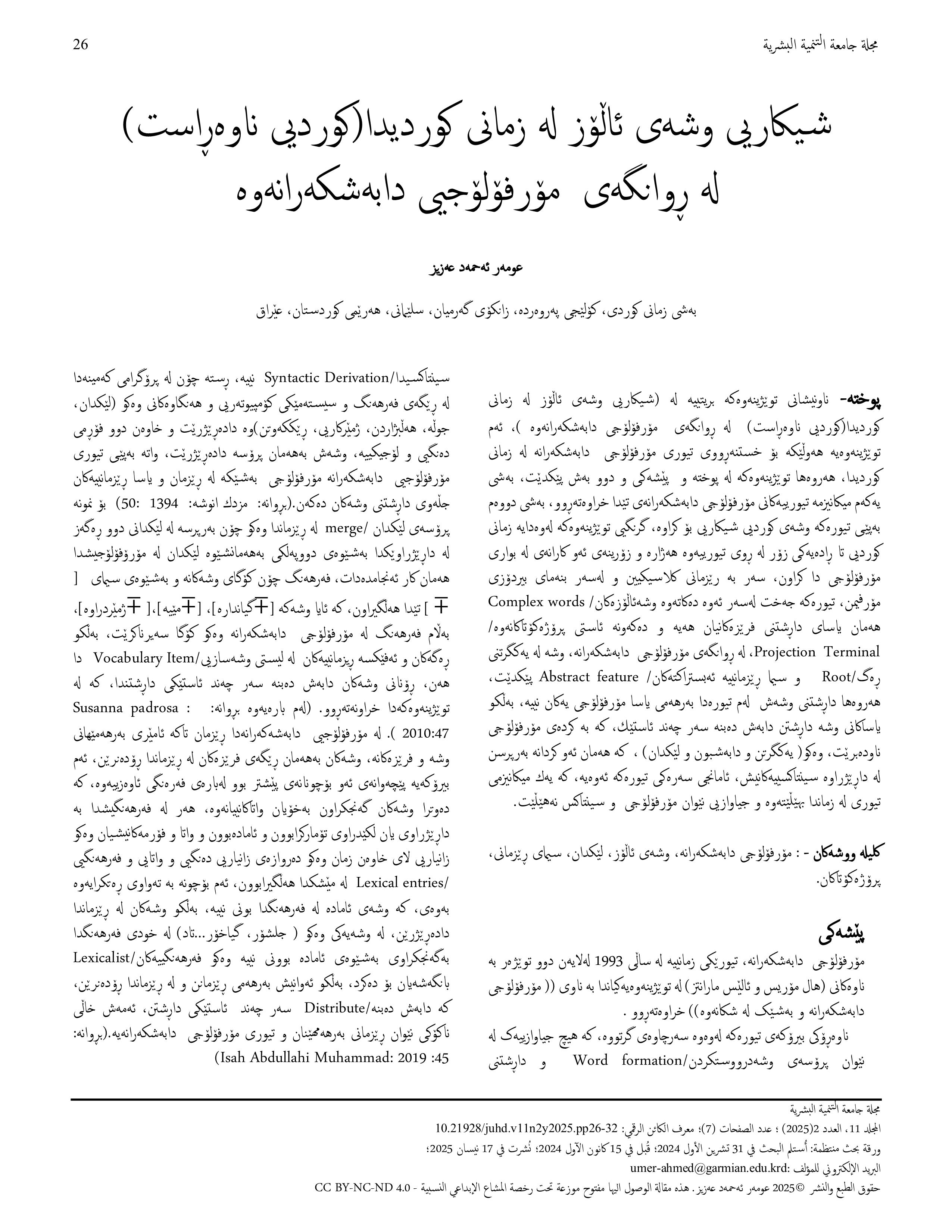Complex word analysis in Kurdish language (central Kurdish) from view Distributed Morphology
DOI:
https://doi.org/10.21928/juhd.v11n2y2025.pp26-32Keywords:
Distributed morphology, Terminal projection, Complex words, Grammatical Feature, MergeAbstract
The title of the research is (Complex word analysis in Kurdish language (central Kurdish) from view Distributed Morphology.) This paper is an attempt to present the distributive morphology theory in Kurdish. The study also consists of an abstract, an introduction and two parts. The first part presents the theoretical mechanisms of distributed morphology. The second part analyses Kurdish words according to the theory. The importance of this study is that Kurdish language is very poor in terms of theory. Most of the work in morphology is based on traditional grammar andmorpheme theory.
The theory emphasizes that complex words have the same rules of derivation of phrases and fall at the level of terminal projects. From the point of view of distributed morphology, words consist of the combination of roots and abstract grammatical features. In this theory, word formation is not the product of morphological rules independently and separately the main goal of the theory is to maintain a single theoretical mechanism in language and eliminate the distinction between morphology and syntax.
References
Andrew Spencer) (1997 MORPHOLOGICAL THEORY an Introduction to Word Structure in Generative Grammar 5th edition USA.
Daniel sidiqi (2009), syntax within the word, john Benjamin Company, USA.
David Embick (2020) the motivation for roots in distributed morphology , Annual Review of Linguistics, Department of Linguistics, University of Pennsylvania, Philadelphia, Pennsylvania 19104, USA;
Halle, Morris & Alec Marantz. 1993. 'Distributed Morphology and the Pieces of Inflection.' In The View from Building 20, ed. Kenneth Hale and S. Jay Keyser. MIT Press, Cambridge, 111–176.
Mahya Ahmadi1& Mazdak (2019) what is Distributed Morphology, پژوهشهای زبانی سا10 ش.2 1398 (ص1-20)
Ora Matushansky and Alec Marantz (2013), Distributed Morphology Today, the MIT Press, Cambridge, Massachusetts, London, England
Roland pfau,) 2009 (grammar as a processor, Jon Benjamin company, USA
Susanna padrosa Taris (2010), complex word- formation and the morphology –syntax interface, pdf dissertation, university of autonomy in Barcelona.
عومەر ئەحمەد عەزیز (2023) تیوری پاساودان لە زمانی كوردیدا (دكۆترا) انكۆی گەرمیان.
Isah Abdullahi Muhammad (2019)، طبقهبندی واژههای مرکب زبان فارسی از منظرنظریة صرف توزیعی ،Macrolinguistics, Vol.7 No.1 (Serial No.10) 2019 pp.45-56
شجاع تفكری و علی رضا سلیمانی( 1397) مجهول در زبان فارسی از منڤر صرف توزیعی، دوهمانامە علمی- پژوهش(ش1) پیایی 43 ص161-183
علیرضا سلیمانی مقدم ،شجاع تفکری رضایی ،عامر قیطوری (2021) مقایسۀ ساخت نحوی و ترتیب خطی مقولههای تصریفی فعل در زبان فارسی از منظر، صرف توزیعی، 22فصلنامۀ مطالعات زبانها و گویشهای غرب ایران، دورة دهم، شمارة ،1بهار 1021
گلاره نظری& جلال رحیمیان&مهرزاد منصوریچکی (1399)، بررسی انضمام در فارسی بر اساس صرف توزیعی، شناسی های زبان پژوهش نشريه سال دوازدهم ، شماره دوم، شماره ترتيبی ،32پاييز و زمستان 9211، نوع مقاله: پژوهشی.
مزدك انوشه(1394) فرافکنهاي نمود و زمان در صفتهاي فاعلی مرکببر پایۀ نظریۀ صرف توزیعی، د وماهنامۀ جستارهاي زبانید ، 6ش) 5پیاپی ،(26آذر و دي ،1394صص72)
غلام حسین کریمی دوستان&مهدیه اسحاقی( 1398) 216 - ص22 پژوهشهای زبانشناسی، دانشگاه اصفهان، سال یازدهم، شماره دوم، شماره ترتیبی ،12پاییز و زمستان 2931
اهو الوند& زینب محمد ابراهیمی& جهرمی استادیار (1401)، بررسى ساختار نحوى افعال مركب دوجزئى بر ثاية نظرية صرف توزيعى، مجلة زبانشناسى و طويش خراسان، سال چهاردهم، شمار2، تابستان 1401، شمارە پیایی 27.

Downloads
Published
How to Cite
Issue
Section
License
Copyright (c) 2025 OMAR AHMED AZEEZ

This work is licensed under a Creative Commons Attribution-NonCommercial-NoDerivatives 4.0 International License.


